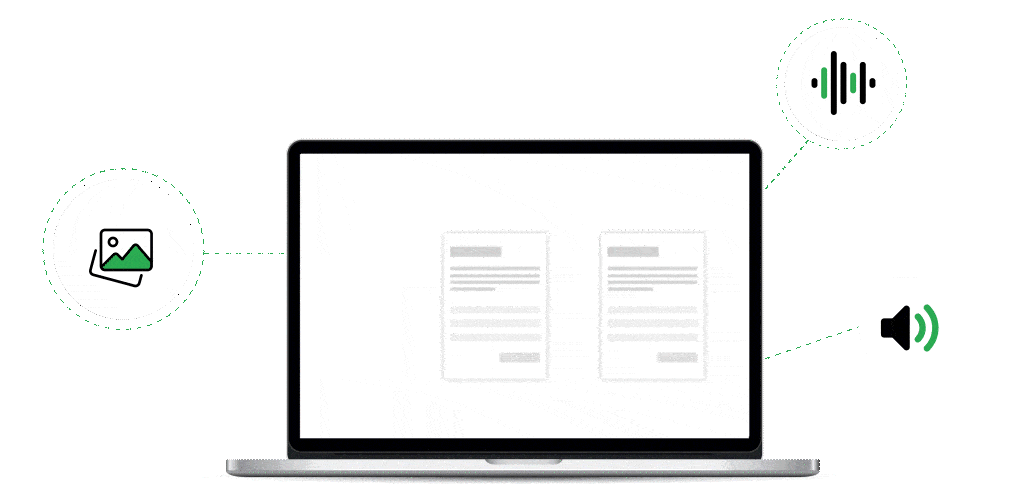
How Our AI-Powered Accelerators Can Solve Real-World Challenges In Healthcare
In the evolving healthcare landscape, providers, payers, pharma companies, and digital health platforms are under immense pressure to deliver better care, streamline operations, and remain compliant—all while managing costs. The good news? AI and Generative AI (GenAI) are no longer just buzzwords—they’re actionable, impactful technologies that are transforming how healthcare works.
At WalkingTree, we’ve developed a suite of powerful AI-powered accelerators that are redefining what’s possible in healthcare. From automating clinical audits to personalizing patient engagement, these tools are designed to tackle real-world challenges with intelligence, scale, and efficiency.
Let’s explore how these accelerators are solving critical healthcare use cases:
Intellexi – Automating Insights from Clinical and Contractual Data
Imagine turning complex contracts, patient records, compliance documents, or research papers into structured, actionable insights—instantly. Intellexi makes this possible with AI-powered data extraction and ontology-driven accuracy, transforming unstructured information into valuable knowledge for improved decision-making, efficiency, and compliance.

Real-World Impact:
- Contract Audit Automation: Extract key terms, clauses, and obligations from managed care contracts to automate billing validation, enforce compliance requirements, trigger automated notifications for renewals or expirations, and identify potential risks or opportunities.
- Clinical Documentation Structuring: Convert unstructured Electronic Health Record (EHR) data, physician notes, and medical reports into usable formats (e.g., FHIR) for advanced analytics, compliance reporting, quality of care improvement, and seamless data exchange between healthcare systems.
- Regulatory Compliance Automation: Extract critical information from regulatory documents, policy manuals, and legal texts to automate compliance monitoring, identify potential violations, and generate audit reports, ensuring adherence to complex healthcare regulations and reducing compliance costs.
- Drug Discovery and Research Acceleration: Extract data from scientific publications, clinical trial reports, and patient databases to accelerate drug target identification, predict drug interactions, and identify patient cohorts for research studies, ultimately speeding up the development of new therapies and improving research outcomes.
- Personalized Medicine Enablement: Extract and structure patient data, including genetic information, lifestyle factors, and medical history, to identify personalized treatment options, predict treatment responses, and deliver tailored interventions for improved patient outcomes.
- Revenue Cycle Optimization: Automate the extraction of billing codes, insurance information, and patient demographics from medical documents to streamline claims processing, reduce billing errors, identify underpayments, and optimize revenue cycle management for healthcare providers.
- Risk Management and Fraud Detection: Extract relevant information from patient records, claims data, and financial documents to identify patterns indicative of fraud, waste, or abuse, enabling proactive risk mitigation and reducing financial losses in the healthcare system.
- Improved Decision Support: Transform unstructured data into actionable insights that can be readily consumed by decision support systems, empowering clinicians and administrators with timely and relevant information for better care decisions and operational efficiency.
Expected Results
Can reduce manual review time by more than 60%, enhance compliance, and improve real-time decision-making – unlocking the hidden value within their complex data to significantly improve overall performance across the healthcare ecosystem.
Aspira – Conversational AI for Patient Engagement and Research
Need to conduct patient follow-ups, clinical trial interviews, or satisfaction surveys, or even capture the conversation between doctor and patients in a meaningful and compliant way? Aspira, a voice-based conversational agent, can automate these interactions with natural, unbiased, and scalable conversations, transforming communication and data capture across the healthcare ecosystem.

Real-World Impact:
- Patient Surveys & Follow-ups: Conduct post-discharge assessments, gather patient feedback on care experiences, and automate follow-up appointments without needing live staff, improving patient satisfaction and freeing up clinical resources.
- Clinical Research Interviews & Data Collection: Standardize and automate data-rich conversations with clinical trial participants, collect patient-reported outcomes (PROs), monitor adverse events, and ensure data consistency and accuracy, enabling efficient and cost-effective clinical research.
- Automated Prescription Assistance: Aspira can join a conversation between the doctor and the patient to transcribe notes, extract needed information (e.g., allergies, current medications), create draft prescriptions, and provide an editable document to the doctors for their review and finalization, streamlining the prescription process and reducing administrative burden.
- Triage & Symptom Assessment: Automate initial patient triage, gather detailed symptom information, assess risk levels, and direct patients to the appropriate care setting, improving patient flow and reducing emergency room congestion.
- Medication Management & Adherence: Provide personalized medication reminders, deliver dosage instructions, monitor side effects, and offer support to improve patient adherence to treatment plans and optimize medication effectiveness.
- Remote Patient Monitoring & Support: Conduct virtual check-ins with patients, monitor chronic conditions, collect health data, provide educational resources, and offer emotional support, enabling proactive care management and improving patient outcomes.
- Mental Health Screening & Support: Administer standardized mental health assessments, provide supportive listening, offer coping strategies, and connect patients with appropriate mental health resources, increasing access to mental healthcare and reducing wait times.
- Appointment Scheduling & Reminders: Automate appointment booking, send personalized reminders, manage cancellations and rescheduling, and reduce no-show rates, improving clinic efficiency and patient access to care.
- Patient Education & Onboarding: Deliver personalized educational materials, provide pre-visit instructions, explain treatment plans, and onboard new patients to healthcare services, enhancing patient understanding and engagement.
Expected Results
Can improve data quality, ensure faster feedback cycles, reduce operational costs and enable more efficient, scalable, and patient-centered communication – improving outcomes for patients, providers, and researchers.
AgenTree – Building Intelligent Healthcare Agents at Scale
Healthcare workflows are complex, often requiring automation beyond simple rules. AgenTree provides a reference architecture to build AI agents that can automate several complex tasks in the Healthcare industry, improving efficiency, reducing costs, and enhancing patient care.

Real-World Impact:
- Claims Validation Agents: Automate claims processing, fraud detection, and pre-authorization workflows, reducing administrative overhead and accelerating reimbursement cycles.
- Patient Support Agents: Book appointments, manage medications, provide pre-visit instructions, answer FAQs autonomously, and offer personalized health reminders, improving patient engagement and reducing the burden on clinical staff.
- Diagnostic Support Agents: Assist clinicians in analyzing medical images, identifying potential diagnoses, and suggesting treatment plans based on patient data and medical knowledge, leading to faster and more accurate diagnoses.
- Remote Monitoring Agents: Continuously monitor patients’ vital signs and health data remotely, detect anomalies, and trigger timely interventions, enabling proactive care and reducing hospital readmissions.
- Personalized Treatment Planning Agents: Analyze patient data, medical history, and genetic information to generate personalized treatment plans, optimize medication dosages, and predict treatment outcomes, leading to more effective and targeted therapies.
- Drug Discovery Agents: Accelerate the drug discovery process by analyzing vast datasets, identifying potential drug targets, and predicting drug interactions, ultimately leading to faster development of new and effective treatments.
- Clinical Trial Management Agents: Automate patient recruitment, data collection, and adverse event monitoring in clinical trials, improving efficiency and reducing the time and cost of research.
- Mental Health Support Agents: Provide empathetic and accessible mental health support, offer coping strategies, and connect patients with appropriate resources, increasing access to mental healthcare and reducing stigma.
Expected Results
Scalable, intelligent automation with 24/7 availability and human-like responsiveness – leading to improved outcomes for patients, providers, and the healthcare system as a whole.
eCAI – Intelligent Querying for Clinical and Operational Insights
Accessing the right data in real-time can make or break care quality, operational efficiency, and research breakthroughs. eCAI empowers users to query complex enterprise systems conversationally, surfacing accurate, role-based insights powered by Large Language Models (LLMs), simplifying data access and transforming how healthcare professionals interact with information.

Real-World Impact:
- Clinical Decision Support: Doctors get instant, tailored insights on patient history, relevant medical literature, potential drug interactions, and treatment guidelines, all through natural language queries, enabling faster, more informed, and personalized care decisions at the point of care.
- Operational Dashboards & Reporting: Admin staff and managers can query KPIs, resource utilization, patient flow, and financial performance metrics conversationally, generating customized reports and dashboards without needing specialized analysts or complex data extraction processes, improving operational efficiency and strategic planning.
- Personalized Patient Education: Patients can ask questions about their conditions, treatment plans, medications, and aftercare instructions in natural language, receiving tailored and easy-to-understand answers, improving patient engagement and adherence to care plans.
- Drug Discovery & Research: Researchers can query vast and disparate datasets, including clinical trial data, genomic information, and medical publications, to identify potential drug targets, explore disease mechanisms, and accelerate research breakthroughs through conversational access to complex information.
- Revenue Cycle Management: Billing staff can query claims data, insurance information, and patient payment histories conversationally to identify billing errors, track outstanding payments, and optimize revenue cycle processes, improving financial performance and reducing administrative costs.
- Compliance & Audit Support: Auditors and compliance officers can query system logs, patient records, and policy documents conversationally to track compliance with regulations, identify potential risks, and generate audit reports, streamlining compliance monitoring and reducing audit burden.
- Population Health Management: Public health officials and healthcare organizations can query population health data, demographic information, and social determinants of health conversationally to identify trends, predict outbreaks, and develop targeted interventions to improve community health outcomes.
- Care Coordination: Care coordinators can query patient information, appointment schedules, and resource availability conversationally to streamline care transitions, schedule appointments, and coordinate services across different providers, improving care coordination and reducing fragmentation.
Expected Results
Faster, democratized access to information and smarter decision-making – leading to improved outcomes in patient care, operations, research, and administration.
Auto Task – Automating the Mundane, Empowering the Impactful
From appointment scheduling to clinical research reminders, Auto Task automates task management by intelligently interacting with day-to-day working tools and systems, deriving action items, performing actions, and providing suggestions for review/edit and confirmation, thus freeing up significant bandwidth for more meaningful work and acting as a true copilot for healthcare professionals.

Real-World Impact:
- Hospital Workflow Automation: Automate patient appointment scheduling, pre-admission tasks, diagnostic test scheduling, patient follow-ups, medication refill reminders, discharge planning, and critical alerts, streamlining hospital operations and improving patient flow.
- Clinical Research Task Management: Keep clinical trials on track with automated participant reminders, data collection prompts, adverse event reporting, and regulatory document management, improving research efficiency and data quality.
- Automated Patient Communication: Automate personalized patient reminders for appointments, medication adherence, and preventive care screenings, improving patient engagement and adherence to treatment plans.
- Streamlined Medical Documentation: Automate the population of patient charts with relevant information from various sources, generate summaries of patient encounters, and assist with coding and billing processes, reducing administrative burden and improving documentation accuracy.
- Proactive Care Coordination: Automate reminders for care team members regarding patient follow-up, referrals, and care transitions, ensuring timely and coordinated care delivery and reducing fragmentation.
- Efficient Supply Chain Management: Automate inventory tracking, ordering of medical supplies, and management of pharmaceutical stock, optimizing supply chain operations and reducing waste.
- Personalized Healthcare Reminders: Automate personalized reminders for patients regarding preventive screenings, vaccinations, and lifestyle modifications, promoting proactive health management and disease prevention.
- Automated Reporting and Analytics: Automate the generation of reports on key performance indicators, patient outcomes, and operational metrics, providing healthcare professionals with timely insights for decision-making and quality improvement.
Expected Results
By automating mundane tasks and streamlining workflows, Auto Task empowers healthcare professionals to focus on high-value activities, ultimately improving patient care, enhancing operational efficiency, and driving better outcomes across the healthcare ecosystem.

